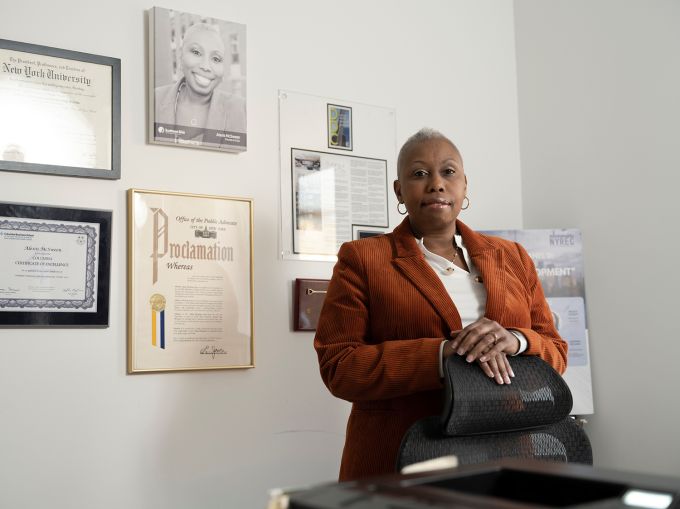Alexis McSween Grabbed a Career in CRE and Wants to Take Others With Her
By Larry Getlen February 27, 2023 7:30 am
reprints
When Alexis McSween was in her teens, she experienced periodic bouts of homelessness. Her father had left and her mother had all sorts of financial and personal woe. To find a place to sleep, she sometimes had to get creative.
“I’ve stayed in the Lower East Side, in nice, small buildings where you could get in. People wouldn’t know anybody was there,” said McSween. “You go up to the bulkhead and then no one bothers you. To me, that was safer than going to a shelter.”
Fortunately, McSween’s homeless period didn’t last long, and she has been able to spend much of her life putting that same resourcefulness into creating the sort of housing and opportunities for others she once lacked herself.
In 2020, McSween, founder and CEO of Bottom Line Construction and Development, was awarded the New York Female Entrepreneur of the Year Award by the Small Business Administration. Then, last year, she won the “WBE” Award from The Competitive Edge Conference, a professional development organization, after being submitted for consideration by the New York City School Construction Authority (SCA).
McSween won the latter award, she said, because in addition to her primary company, she also founded a non-profit called Youth Construct, which introduces young people to careers within architecture, construction, engineering and development.
“Youth Construct was formed at the height of the pandemic,” said McSween. “A lot of kids had lost their summer youth employment contracts. We always took on interns, but at that time we only had one job. There was a need. So we were like, how can we make more of an impact during this difficult time? With the help of Columbia University and some MBA students, we put together this really great curriculum. We’re in the second cohort now. We had 90 applicants, and we can only take 25.”
The Youth Construct program is indicative of how McSween approaches business. Despite starting out amid the toughest of conditions, she has always sought to help others progress along with her as she has furthered her own success.
“Alexis is a builder in every sense of the word: community building, people building, and she builds buildings,” said Nancy Carin, executive director of the Business Outreach Center Capital Corp., a community development financial institution that has worked with McSween on numerous projects. “Alexis developed a skill set around construction project management and building that set her up to be very successful, and then she decided to take that to the next level and build the community through its youth. She’s incredible to work with. There’s a strong relationship component to working with Alexis all the time.”
McSween, 54, was raised in the South Jamaica section of Queens.
“My mom was pretty resilient. She had me when she was around 20,” McSween said. “Unfortunately, my father didn’t want to have me. She decided to keep me, and my father’s mother, believe it or not, took my mom in and helped her through that entire process — pregnancy, birth, all that great stuff.”
McSween and her mother, Jua, were part of a close knit community of friends and co-workers until leaving New York when McSween was nine. Jua, despite only two years of college, was a successful computer programmer, moving around the country to progressively better jobs. Over the next five years, they lived in Chicago, California and Ohio before eventually returning to New York.
Still, her mother always seemed to work two jobs, and had financial difficulties that led them to periods of homelessness during McSween’s teenage years.
While she never fully understood the true nature of her mother’s financial difficulties, she believes they were related to a cocaine problem her mother developed around this time.
“There definitely were some tough times,” McSween said. “She would say that we didn’t have enough money for food. So she’d make sure I ate, and then she would try and talk to my father to get money, but he was messed up. So then she would say, ‘forget him, I’ll just figure it out myself’.”
This time furthered a sense of independence that had been nurtured in McSween almost from birth.
“She raised me to be independent,” McSween said. “From the time I came out of the womb, she was like: ‘Okay, now let me show you how to cook. Let me show you how to do this.’ When you spoke to little me, I was like, ‘Oh, I know how to do that.’ I knew how to do everything — not realizing that I really shouldn’t have been doing all those things.”
Tired of the chaos at home, McSween began running away around age 15. After a few instances, Family Court threatened to make her a ward of the state if she ran away one more time and McSween stopped but she wound up in her first apartment of her own at 17 years old, in Harlem, thanks to public assistance.
Around this time, she formed her first business, a cleaning service called College Students on the Move.
“I didn’t really know how to clean, and I hadn’t even graduated high school yet,” said McSween, who would eventually get a GED before earning her bachelor’s and master’s degrees.
McSween worked for another cleaning service for three months and learned how to both clean and run the business. In the end, she felt the man she worked for didn’t treat his workers well, and when she formed her operation, his clients came with her.
Along the way, she met some contractors who were renovating condos in Trump Tower and hired her to clean them.
“They were these beautiful condos; the contractor would drill a hole, and I’m over there sweeping it up. It was the easiest work in the world,” McSween said. “I called all my friends and said, ‘Come get this job.’ We made $125 a day, which was a big deal back then, plus we got lunch.”
After she left that job, she had a short stint as a cab driver — “I had no sense of direction,” she said — before becoming an EMT and then, eventually, a nurse.
“As an EMT, you see the blight,” she said. “You see the poor housing being offered in our communities — not just the outside, but you always see the inside too. They were terrible.”
At 24 years old, shortly after she earned her nursing degree, McSween bought her first multifamily property, a three-unit private home in the Springfield Gardens section of Queens, using money she had saved, State of New York Mortgage Association loans, and other government resources for first-time home buyers. Working as a nurse in White Plains during the day and as an EMT at night, she still couldn’t afford to move into her own house.
“I moved the tenants in first,” McSween said. “I gutted their apartments and did them over and they moved in. I was able to move in about a year later. I renovated the basement completely, made it really nice, and I lived in the basement.”
While she had always intended to live there, she bought several other small multifamily properties, two- or three-family renovations, a few years later strictly for investment.
Throughout her late twenties and early thirties, she was regularly buying homes, renovating them, and then selling them on her own. (She hadn’t founded her company yet.) As she did, she learned more about the industry, including which aspects spoke to her and which did not.
“I purchased an eight-family in Brooklyn that had 300 violations,” McSween said, noting that she cleaned up the violations. “That’s when I learned that I definitely didn’t want to do property management.”
Around this time, McSween also purchased an 800-square-foot building that had housed a plumbing company. She razed the building and replaced it with a 4,000-square-foot commercial property with room for five businesses. It was her first ground-up commercial retail building, and her first foray into triple net lease. Completed in 2002, she sold the property last year for $1.3 million.
While working on her many projects, plus EMT and nursing jobs, McSween also got her bachelor’s degree in organizational management from Alliance University, and her masters of science in real estate development, with a minor in construction management, from New York University’s Schack Real Estate Institute.
Around 2008, as the economy began to collapse, McSween was working on three development projects, one renovation and two ground-ups, while attending graduate school, and her contractor went belly-up.
“The general contractor decided not to pay the subcontractors, so the subcontractors stopped working,” McSween said. “So there I was in school, still working, and when you’re a smaller developer, there is no developer fee. So you’re borrowing from Aunt Maggie or whoever to get these projects done. You might get a construction loan, but that construction loan usually doesn’t involve a developer fee.”
McSween used what she had to hire subcontractors, renegotiating with them for rates she could afford to finish the project. She feared bankruptcy, believing that a new, fresh out of school developer — and a Black woman, no less — wouldn’t be able to secure projects with a bankruptcy on her record.
She tried to speak to the New York City Department of Buildings, but they wouldn’t talk to her even though she was the developer, since they said they would only speak to the project’s contractor.
“So I said, ‘Well, what do I need to do to become the contractor?’” McSween said. “And that’s what I did. I went down to the Department of Consumer Affairs, filled out whatever, got the insurance, all that stuff.”
Now a developer and a contractor, McSween made it official after her NYU graduation in 2010 when she left nursing full-time, formed Bottom Line, and made development and construction her full-time career.
McSween said that Bottom Line works more construction than development projects on a day-to-day basis, citing the company’s MWBE (Minority/Woman-Owned Business) certification and work with the SCA Mentor Program as helping her procure more business.
She cites Bottom Line’s work as a first-tier subcontractor for the restoration and redevelopment of Harlem’s Victoria Theater as a major milestone for the company.
“That was huge. That was a $7 million project,” McSween said. “We had eight trades under us, all interior trades including flooring, doors, and millwork.”
Bottom Line’s development projects include the Baldwin Park Condominiums, a 10,000-square-foot, six-unit boutique condo building she worked on for five years at 306 West 148th Street.
“It’s named after James Baldwin,” McSween said of the legendary writer. “It’s beautiful. The units are floor-throughs, and the building has a rooftop garden and two penthouses.”
Billy Procida, CEO of Procida Funding and Advisors, met McSween during a lecture he gave at NYU. As is his habit, he gave his business card to everyone at the lecture, saying if they ever needed assistance with a deal to give him a call.
McSween kept the card and called him years later, while developing Baldwin Park. The two developed a close working relationship, with Procida providing the financing for the project.
“She was bright like a light bulb,” Procida said, noting how much of her time goes to helping others in projects like the Youth Construct program, which his firm is now heavily involved in. “She’s not that rich to be donating so much of her time, but she just doesn’t care [about how much time it takes]. She wakes up every morning and her sole purpose is to make the world better through construction and development.”
Other ground-up projects Bottom Line has developed over the years include a single-family residential unit at 177-55 Troutville Road in Springfield Gardens; a 3,300-square-foot commercial property at 217-01 Merrick Blvd. in Laurelton, Queens; and a 2,000-square-foot two-family home at 122-03 Long Street in Jamaica, Queens.
And Bottom Line is currently at work on seven construction projects, and on the development side is submitting requests for proposals and considering potential future deals. McSween said the company averages five or six employees at any one time, and annual revenues of $4 to $6 million.
Given all her activity, McSween laughs when she is asked what she does for fun, or when she has downtime.
“Downtime? What’s that?” she said. “No, I definitely like to play. I’m passionate about my friends. I’m passionate about family. I’m passionate about house music. And I love to travel. The last places I went to were Germany and Amsterdam over the summer. But it’s hard, because like everybody else, we don’t have [enough] people.”
In the long term, McSween looks forward to continuing to work on projects that have a real impact on their communities.
“The development path is huge, and you can really make a difference,” McSween said. “I create aesthetically pleasing structures, versus investors that come into your community and just throw anything up, and are all focused on packing it with tenants. My approach has always been different, and it came from the experience of not having a place to stay, and going into people’s homes as an EMT that were just horrible, with landlords who didn’t care. All that stuff spoke to why I needed to be in this space.”


